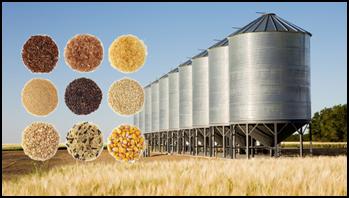India has recorded an all-time high foodgrain production of 353.96 million tonnes in 2024-25, including 117.51 million tonnes of wheat and 149.07 million tonnes of rice, bolstering its efforts to ensure food security through robust storage infrastructure, according to an official statement released on Sunday.
The Food Corporation of India (FCI) and state agencies manage a combined covered and Cover and Plinth (CAP) storage capacity of 917.83 lakh metric tonnes (LMT) for central pool grains. Additionally, the country operates 8,815 cold storages with a capacity of 40.21 million metric tonnes to preserve perishables like fruits, vegetables, dairy, and meat. By June 2025, 73,492 Primary Agricultural Credit Societies (PACS) have been computerized, and 5,937 new PACS have been registered to expand decentralized storage, the statement issued by the Press Information Bureau said.
Modern storage infrastructure is critical for minimizing post-harvest losses, stabilizing prices, and linking farms to markets, enabling farmers to secure better returns while supporting the food processing industry. Efficient storage ensures year-round availability of essential commodities, maintains buffer stocks, and strengthens the Public Distribution System (PDS), contributing to both agricultural prosperity and national food security.
The FCI, the primary agency for centralized storage, procures wheat, rice, and other grains at Minimum Support Prices to protect farmers’ incomes and maintain buffer stocks. These are stored in scientifically managed warehouses and modern steel silos. As of July 1, 2025, the total storage capacity with FCI and state agencies stood at 917.83 LMT. Cold storage infrastructure, vital for perishables, includes facilities for pre-cooling, sorting, grading, and refrigerated transport, reducing losses and maintaining quality.
Decentralized storage through PACS, introduced in 1997-98, allows state governments to procure, store, and distribute grains locally under the National Food Security Act and other welfare schemes, saving transit costs and catering to local preferences. PACS, with village-level storage capacities of 500 to 2,000 metric tonnes, enable farmers to store grains closer to home, avoid distress sales, and secure better prices. A Rs 2,516-crore project has computerized 73,492 PACS by June 2025, enhancing transparency and efficiency, while 5,937 new PACS have been registered to expand their reach.
The government is supporting storage infrastructure through multiple schemes. The Agriculture Infrastructure Fund (AIF), launched in 2020, has sanctioned Rs 73,155 crore for 1.27 lakh projects, including warehouses and cold storages, with a total project cost of Rs 1.17 lakh crore as of September 2025. The Agricultural Marketing Infrastructure (AMI) scheme has sanctioned 49,796 storage projects across 27 states, creating a capacity of 982.94 LMT with a subsidy of Rs 4,829.37 crore by June 2025. The Pradhan Mantri Kisan SAMPADA Yojana (PMKSY) has approved 1,601 projects, with 1,133 operational, creating a processing capacity of 255.66 LMT per year.
The Capital Investment Subsidy Scheme provides 35% to 50% subsidies for cold storage projects, promoting scientific storage for perishables. The World’s Largest Grain Storage Plan, launched in 2023, focuses on decentralized storage through PACS, with godowns completed in 11 PACS across 11 states and over 500 identified for new construction as of August 2025. Modern steel silos, with a capacity of 27.75 LMT completed at 48 locations and 36.875 LMT under construction at 87 locations, enhance scientific storage. Additionally, 177 FCI-owned vacant sites have been identified for new godowns with a capacity of 17.47 LMT.
The Central Sector Scheme for Storage, focusing on North Eastern states, Himachal Pradesh, Jharkhand, and Kerala, has released Rs 379.50 crore for the Northeast and Rs 104.58 crore for other regions. The Private Entrepreneurs Guarantee (PEG) scheme, introduced in 2008, encourages private investment in scientific warehousing by guaranteeing storage capacity hiring.
With a growing population and changing climate, efficient storage and distribution are essential to ensure food security, reduce losses, and stabilize prices, reinforcing agriculture’s role as the backbone of India’s economy and food systems, the statement added.










